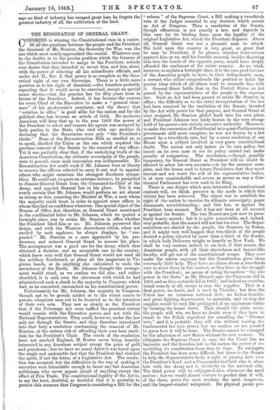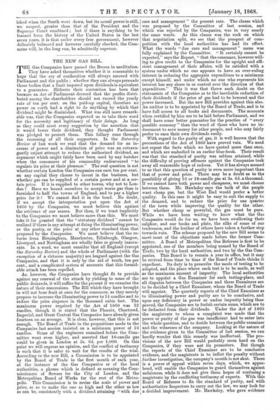THE RESIGNATION OF GENERAL GRANT.
CONGRESS is winning the Constitutional race in a canter. Of all the questions between the people and the President the dismissal of Mr. Stanton, the Secretary for War, was the one which most nearly approached the crucial. Whatever may be the doubts as to the precise position which the framers of the Constitution intended to assign to the President, nobody ever denies that they intended to invest him, and him alone, with the power of selecting all his subordinate officials, and under Art. II., Sec. 2, that power is as complete as the theo- retical right of our own Sovereign. There is a little more question as to his right of dismissal,—the founders probably expecting that it would never be exercised, except on special cause shown,—but the practice has for fifty years been in favour of the President. Indeed, it has become the custom for every Chief of the Executive to make a " general clear- ance" of his predecessor's nominees, and the theory that " rotation in office" is good alike for the nation and for the political class has become an article of faith. No moderate American will deny that up to the year 1866 the power of the President to select and remove his agents was accepted by both parties in the State, who vied with one another in declaring that the Secretaries were only " the President's clerks." None of the Reconstruction Bills so startled or, so to speak, shocked the Union as the one which required the previous consent of the Senate to the removal of any officer. Yet it was perfectly clear that, if the underlying truth of the American Constitution, the ultimate sovereignty of the people, were to prevail, some such innovation was indispensable. No Reconstruction Act could work if Mr. Johnson were at liberty to remove the officers selected to carry it out, and to appoint others who might entertain the strongest Southern sympa- thies. He could not, to quote an extreme instance, be permitted to dismiss General Grant from the Command-in-Chief of the Army, and appoint General Lee in his place. Yet it was nearly certain that Mr. Johnson would perform an act almost as strong as this, removing the Minister at War, a man whom the majority could trust, in order to appoint some officer in whom theyhad no confidence whatever. One special object of the Tenure of Office Act, therefore, as General Grant mentioned in the confidential letter to Mr. Johnson, which we quoted a fortnight since, was to retain Mr. Stanton in office whether the President liked him or no. Mr. Johnson perceived this design, and with the Western shrewdness which, when not excited by mob applause, he always displays, he " sus- pended " Mr. Stanton as a man appointed by his pre- decessor, and ordered General Grant to assume his place. The arrangement was a good one for the Army, which thus obtained a dictator, and an acceptable one to the country, which knew very well that General Grant would not send all the artillery Southward, or place all the magazines in Vir- ginian hands, or do anything else calculated to undo the ascendency of the North. Mr. Johnson thought the arrange- ment would stand, as we confess we did also, and rather chuckled, it is said, over the cleverness with which he had administered such a check to the majority in Congress, which had, as he conceived, encroached on his constitutional power.
Unfortunately for Mr. Johnson, the majority in Congress, though apt to be grossly misled as to the wisest course to pursue, comprises men not to be deceived as to the intention of their own acts. They saw as clearly as the President that if the Patronage Act were baffled the practical victory would remain with the Executive power, and not with the National Representatives. They could, however, under the law only act through the Senate, and they therefore introduced into that body a resolution condemning the removal of Mr. Stanton, at the serious risk of offending their own best candi- date for the President's Chair. The words of the resolution have not reached England, M. Reuter never being heartily interested in any American subject except the price of gold and petroleum ; but we have no moral doubt it was based upon the single and undeniable fact that the President had violated the spirit, if not the letter, of a Legislative Act. The resolu- tion was accepted, but the difficulties in the way of making it executive were formidable enough to daunt any but American politicians, who never appear afraid of anything except the effect of Free Trade. The constitutional legality of the Act is, to say the least, doubtful, so doubtful that it is probably to protect this measure that Congress is considering a Bill for the " reform " of the Supreme Court, a Bill making a two-thirds vote of the Judges essential to any decision which annuls an Act of Congress. Then a resolution of the Senate, though efficacious, is not exactly a law, and depends in this case for its binding force upon the legality of the original Legislative Act, which the President disputes. Above all, General Grant was not a pleasant man to attack. His hold upon the country is very great, so great that he may be President, if he pleases, whether Conventions approve him or no, and his forcible removal, besides throwing him into the hands of the opposite party, would have deeply offended the sentiment of the entire country. As we tried, however, to explain a fortnight since, it is the rare good fortune of the American people to have, in their indispensable man, a servant who either comprehends the position or holds the precise ideas which of all others tend to reconcile him with it. General Grant holds that in the United States an Act passed by the representatives of the people is the supreme law. Such an Act had been passed to retain Mr. Stanton in office ; the difficulty as to the strict interpretation of the law had been removed by the resolution of the Senate, invested by the Act with power for that purpose, and General Grant at once resigned, Mr. Stanton glided back into his own place, and President Johnson was fairly beaten in the very strong- hold of his power—his strictly executive authority. Moreover, to make the conversion of Presidential into quasi-Parliamentary government still more complete, he was not beaten by a law passed by a two-thirds vote, but by a mere resolution of one House upon a subject involved in very grave constitutional doubt. The nation not only insists on its own policy, but insists on its own man to see its policy carried out, under penalty of resignation. The revolution,—though possibly temporary, for General Grant as President will no doubt be allowed to select his own servants,—is for the moment com- plete, and the lesson read to future Presidents, that they must execute and not resist the will of the representative bodies, is at once unmistakable and severe, as severe as any a Con- tinental Parliament has ever read to its King.
There is one danger which men interested in constitutional contests will, we think, perceive in the mode in which this victory has been achieved. The object was to establish the right of the nation to exercise its ultimate sovereignty, paper documents notwithstanding ; and this has, as against the President, been secured. But it has not been at all secured as against the Senate. The two Houses are just now in pecu- liarly hearty accord ; but it is quite conceivable, and, indeed, very probable, that the accord will not last for ever. The Repre- sentatives are elected by the people, the Senators by States, and it might very well happen that two-thirds of the people desired a policy rejected by more than a third of the Senate, in which body Delaware weighs as heavily as New York. We shall be very curious, indeed, to see how, if that occurs, the American people, with all their shrewdness and lawyer-like faculty, will get out of the constitutional scrape. They must make the nation supreme, but the Constitution gives them extremely little help. They have no clause about a two-thirds vote to assist them in this contest, as they have in the struggle with the President ; no means of voting themselves " the solo power in the State," as Mr. Disraeli says the Commons did in 1831, and as they certainly did in 1867; and indeed no constitu- tional remedy at all, except to stop the supplies. That is a final power, no doubt, and is used in Victoria • but then the Union has an immense national debt, an Indian frontier, and great fighting departments to maintain, and to stop the supplies would be very like getting rid of an unpleasant visitor by burning the house down. That, should the crisis occur, the people will win, we have no doubt, even if they have to resort to the Polish expedient for annulling the " liberum veto," and it is probable they will win without tearing the fundamental law into pieces, but we confess we are puzzled to guess how it will be done. The Senate cannot be swamped by the admission of new States without its own consent. To subjugate the Supreme Court is easy, for the Court has no bayonets, and the founders left to the nation the power of re- modelling its constitution from time to time. To subjugate the President has been more difficult, but there is the Senate to help the Representative body, a right of passing Acts over the President's head, and a Commander-in-Chief who is abso- lute with the Army and is decidedly on the national side.
The third power will be subjugated also, whenever the need arrives ; but we would almost venture to predict that it will, of the three, prove the most resolute, the most dangerous, and the longest-winded antagonist. Its physical power per- ished when the South went down, but its moral power is still, we suspect, greater than that of the President and the Supreme Court combined ; but if there is anything to be learned from the history of the United States in the last seven years, it is that under every free government, however delicately balanced and however carefully checked, the Com- mons will, in the long run, be admittedly supreme.































 Previous page
Previous page